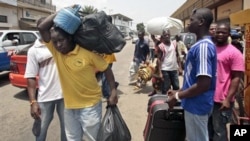The United Nations is asking international donors for more assistance to help the hundreds of thousands of citizens of Ivory Coast stranded in refugee camps and villages.
For more than two weeks now, Ivory Coast has enjoyed its most widespread peace since last November's presidential election boiled over into a civil war.
Yet hundreds of thousands of people are living in whatever distant villages and squalid camps they first went to get away from the fighting.
The U.N. Office for the Coordination of Humanitarian Affairs, or OCHA, warns the country is on the cusp of a health catastrophe.
More than half of this nation's health care clinics are shuttered. In a more prosperous time, many of its major hospitals rivaled those in Europe, but today six of every ten are empty of both employees and medicine after weeks of looting and urban violence.
OCHA spokesman Kayode Egbeleye says the three clinics that are open in the commercial capital of Abidjan, serving a population of about six million, don't even have food, let alone medicine.
International donors have pledged $160 million to help this once economically mighty West African state back on its feet, but Egbeleye says only a small portion of that amount has materialized.
"Out of this amount the real sum that comes to Cote d'Ivoire is like $22.4 million. So we need more resources, we need more money to be able to respond quickly and positively where the needs are most immediately felt, notably in the area of shelter, health, protection of civilians, and this is where we really need to respond quickly," said Egbeleye.
Western Ivory Coast, he says, remains particularly bad shape. In one camp near the western town of Duékoué, Egbeleye says 28,000 people are stuck in a four-hectare plot of tents, the size of just eight football fields.
People living there, he says, face the constant threat of an outbreak of water-born diseases like cholera.
Yet he says, the biggest threat they face is an outbreak of violence. Militiamen have been seen patrolling Ivory Coast's western border with Liberia.
Egbeleye says leftover violence between militias in Ivory Coast have kept OCHA and other aid workers from visiting the most needy parts of its vast rural area.
"The situation we are working in is very difficult. By and large we have donations of drugs that are coming, we have NGOs that are starting community initiatives to deal with garbage collection, water has been restored, but by and large, the issue of access by humanitarian workers to the needy because of insecurity is the problem. It's an obstacle, it's a major obstacle. It's a major obstacle," Egbeleye said.
Banks in Abidjan reopened Thursday, returning some semblance of normal daily life to an economy whose majority of salaried wage earners have not been paid since at least January.
UN Says Displaced in Ivory Coast Need More Help
- By Drew Hinshaw




